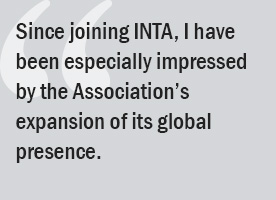What Belonging to INTA Means to Me: George Chan
Published: November 1, 2019
 George Chan is Partner and Head of the Simmons & Simmons (Beijing) Intellectual Property Agency, Simmons & Simmons, Beijing, People’s Republic of China. Here, he discusses how INTA membership has benefitted his company and provided valuable professional resources.
George Chan is Partner and Head of the Simmons & Simmons (Beijing) Intellectual Property Agency, Simmons & Simmons, Beijing, People’s Republic of China. Here, he discusses how INTA membership has benefitted his company and provided valuable professional resources.
Why is your organization an INTA member, and how does it benefit from membership?
There are many obvious advantages to becoming a member of INTA, such as being able to work with brand owners and trademark professionals to promote and support trademark and related intellectual property (IP) rights around the world. This type of a relationship allows us to affect our profession and practice, especially in China where INTA is held in very high regard.
In terms of how our firm generally benefits from being a member of INTA, I asked for input from our international IP practice group and was offered many positive views-actually, too many to express in this interview-of how INTA had benefitted each of them in one way or another. From their comments, I was able to identify one common thread: as much as we view INTA as a professional organization, we also feel that it is a community, which offers people interested in trademarks and related IP rights an opportunity to share experiences and stories with like-minded people.
How long have you personally been an active INTA member, and what does belonging to INTA mean to you?
I was extremely fortunate to have met Ronnie Hoffer (Goodmans LLP, Canada) in 2007, who invited me to join the Examination Guidelines Subcommittee of the Trademark Office Practices Committee, which she chaired. The Subcommittee had just completed its revisions to the INTA Model Examination Guidelines, which I was invited to present to the Intellectual Property Office of the Philippines (IPOPHL) and the Intellectual Property Office of Vietnam.
The meeting with IPOPHL was especially timely as there were some discussions about amending the Philippines’ trademark law at that time, and INTA was provided with an opportunity to engage with IPOPHL to offer its views on the impact of the proposed amendments to Philippine trademark law.
Since joining INTA, I have been especially impressed by the Association’s expansion of its global presence. Credit should be given to our current and past presidents and Board of Directors, as well as INTA CEO Etienne Sanz de Acedo, for their inclusive approach to the organization’s global outreach.
 Outside of the Annual Meeting, how do you make use of your membership throughout the year?
Outside of the Annual Meeting, how do you make use of your membership throughout the year?
This year, I was invited to Bhutan’s first law school, which accepted its first class three years ago, to provide a series of lectures on IP to its L1, L2, and L3 students. As an INTA member, I was provided with INTA’s teaching materials on the subject of trademarks. I was able to use them for the introduction to trademarks lecture, as opposed to creating a lesson plan from scratch, which I greatly appreciated. My understanding is that these were the first IP law lectures offered in Bhutan’s history, and INTA played a part in this.
I am also on the Programming Advisory Council, which is led by Peter Dernbach (Winkler Partners, Taiwan) and Joseph Ferretti (PepsiCo, Inc., USA) and coordinated by INTA Director of Education Sarah O’Connell. Working with a fantastic group of professionals to help shape the format of INTA meetings around the world is simply an amazing experience and offers us a glimpse of emerging issues and cutting-edge developments surrounding trademark law and practice around the world, which you cannot find anywhere else.
In a nutshell, why should trademark professionals join INTA?
As committed trademark professionals, this is where you will feel at home.
Although every effort has been made to verify the accuracy of items in the INTA Bulletin, readers are urged to check independently on matters of specific concern or interest.
© 2019 International Trademark Association